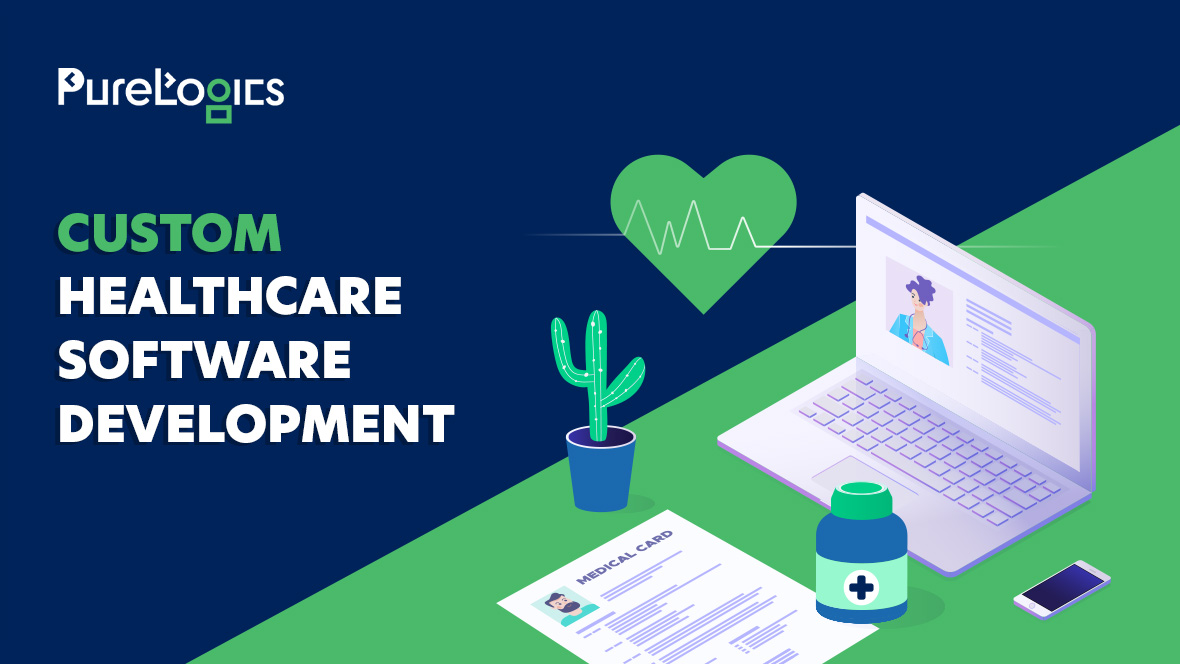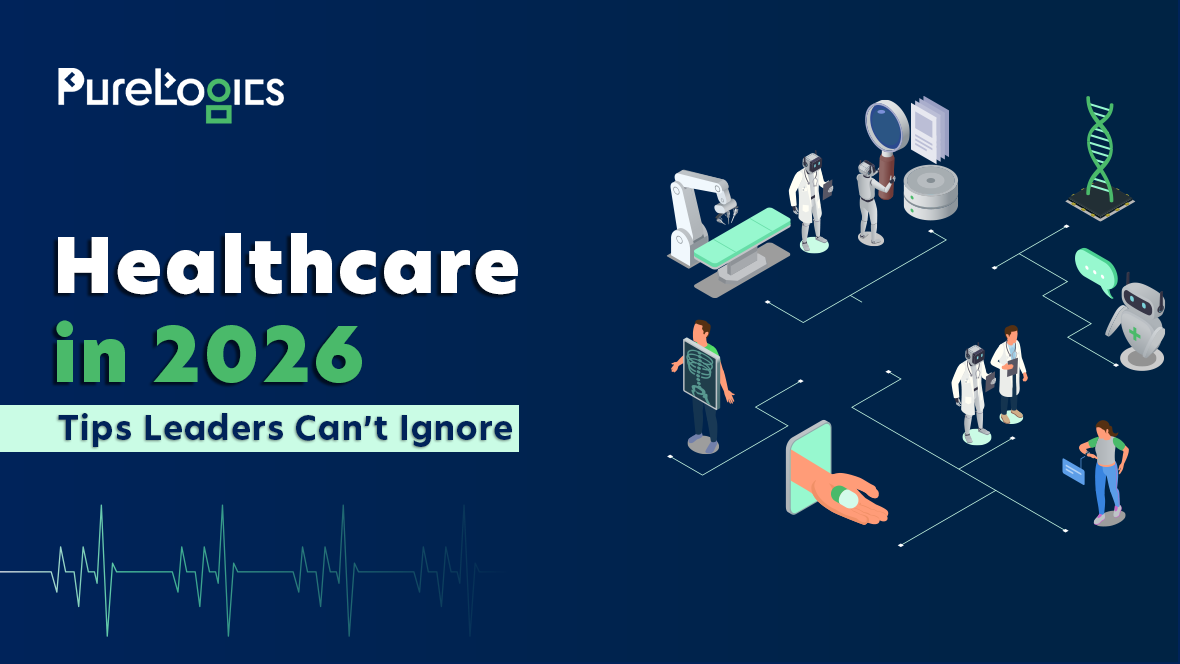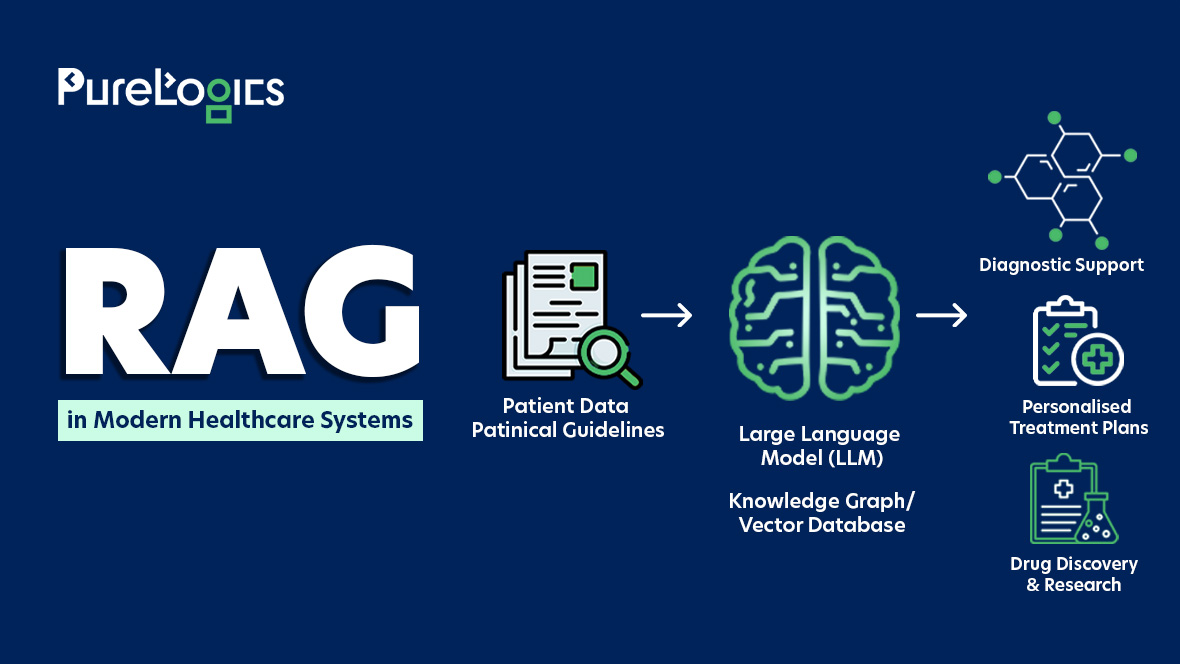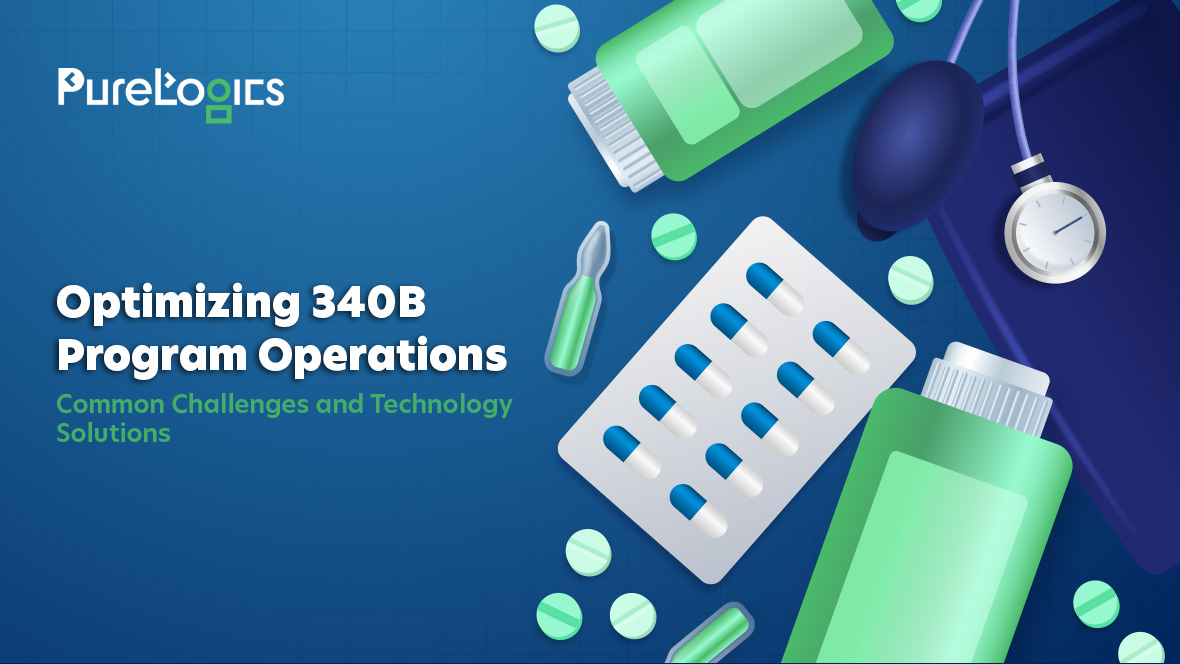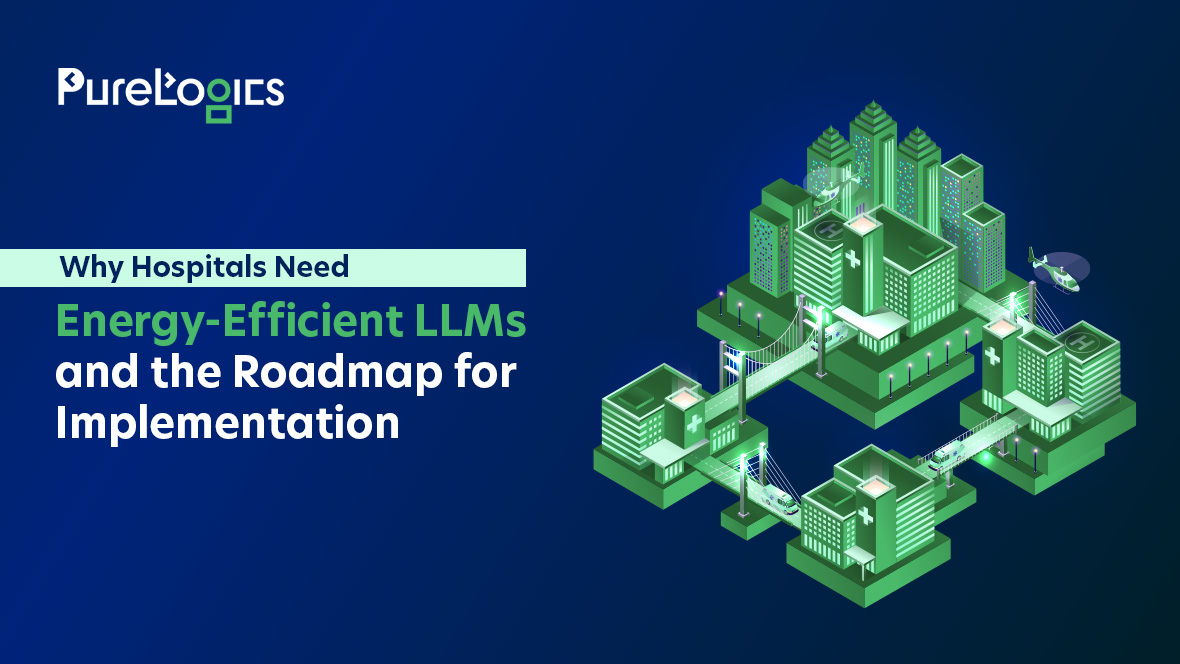The healthcare industry has changed.
It is no longer what it was a decade ago, and this change is due to the need for personalization and collaborative care. Whether it is an off-the-shelf solution or custom healthcare software development, it is better to adopt the one that fulfills your needs.
However, with changing patient, practitioner’s demands and the integration of technologies like IoT and AI suggest that custom healthcare solutions will remain a viable option, primarily due to the flexibility and scalability they offer. The statistics indicate that their adoption will continue to increase, especially in the healthcare industry.

Currently, custom solutions are considered costly, which is true; however, phased implementation or hiring developers on a monthly or hourly basis can help reduce these costs.
So, if you are interested in implementing a custom solution in your healthcare systems, then after reading this blog, you will know:
- What is custom healthcare software developed by a healthcare specialist team?
- Which development approach is best: outsourced vs. in-house vs. hybrid?
- What are the signs that you need a custom healthcare solution?
- How do custom solutions improve efficiency and patient care?
- What is the cost of developing software and the process?
Let’s begin!
What Is Custom Healthcare Software Development?
It is a process of creating a software solution that is specifically designed and developed to meet the unique needs of healthcare providers and patients. These solutions are tailored to tackle the healthcare workflows, compliance requirements, and operational processes.Moreover, they can include tools like EHR/EMR systems, patient engagement apps, telemedicine platforms, and hospital management systems.
Use Case: The Cleveland Clinic wanted to manage its operations efficiently by allowing their medical staff to focus on delivering patient care. To solve this, they deployed AI-powered software to manage bed capacity, staffing, surgical scheduling, patient flow and other related aspects. This helped them optimize resources and streamline operations, which in turn enhanced patient care and reduced wait times. Thus, setting a new standard for hospital management.
Tired of your clunky healthcare software?
We develop intuitive solutions that streamline workflow, boost efficiency, not frustration.
Now you know about custom solutions, so it’s time to tell you about their top benefits.
How does Custom Healthcare Software Improves Patient Efficiency and Care?
Custom healthcare solutions can help improve overall efficiency, thereby enhancing patient care.

Let us tell you about these benefits in detail.
1. Enhanced Patient Care
Custom healthcare software can automate routine tasks and centralize patient information. This helps enhance real-time collaboration among healthcare providers, reducing errors and improving accuracy. Therefore, it helps in improving the overall quality of care.
All in all, the personalized features, such as symptom tracking, alerts, and virtual consultations, enable healthcare providers to monitor their patients’ health and make informed decisions, particularly in cases of chronic disease management, including cardiovascular diseases and hypertension etc. For example, the Royal Hobart Hospital integrated a custom digital system called the Patient Alerts Management Solution. This helped them replace the paper-based chart, offering real-time access to critical patient information and providing instant alerts.
2. Remote Monitoring
The RPM or remote patient monitoring helps healthcare providers track patients’ health data in real-time. Furthermore, the custom healthcare apps can integrate with wearable devices that continuously monitor patients’ vital signs and send real-time data to healthcare providers. This helps them with early intervention in case of anomalies, keeping a close eye on patient health both inside and outside the healthcare facility. Moreover, it also reduces the number of readmissions. For example, West Tennessee Healthcare used the healthcare app to remotely monitor the COVID-19 patients after discharge. The aim behind this measure was to identify any worsening symptoms and reduce the number of readmissions.
3. Efficient Communication
The healthcare ecosystems rely on efficient communication between patients and healthcare providers. Therefore, with the help of custom healthcare software, patients can access their medical records and utilize features such as appointment scheduling and direct communication, helping them stay connected with their healthcare providers. Similarly, healthcare providers can send updates and reminders, ensuring that both parties stay connected in real-time. For example, Caring On Demand is a custom solution that helps healthcare providers connect with patients. It allows the patients to schedule appointments for specific days and times slots. Therefore, it helps the patients and healthcare providers connect immediately.
4. Inventory Management
Customized healthcare software development can help track medical supplies and preventing both under- and overstocking of inventories. This also helps ensure the availability of critical medications whilst reducing the waste. This is useful in enhancing patient safety by preventing medication errors and assisting hospitals to reduce costs. For example, Johns Hopkins Medicine uses advanced inventory management software to optimize supply chain processes, which helps improve the quality of care, enhance safety, and increase patient satisfaction.
5. Specialized EMR Modules
Custom healthcare software can be tailored with EMR modules that can help streamline both administrative and clinical workflows. These modules are more than just record keeping as they provide measurable value for hospitals and patients alike:
- Patient portal module: In this module, the demographic dashboards, centralized patient documents, and messaging features, offer patients more control over their journey while mininmizng errors and enhancing communication.
- MIPS module: A dedicated Merit-based Incentive Payment System module makes it easier for providers to meet federally reporting requirements. It supports progress tracking across quality measures, promoting interoperability goals, and improvement activities, giving organizations a structured way to demonstrate compliance and secure incentive payments.
- Appointment and Billing modules: The appointment scheduling, Revenue Cycle Management (RCM), task management modules work together to reduce paperwork, automate claims, and simply schedules. This also helps in saving time for staff while ensuring swift reimbursement and stronger financial outcomes.
- Microbiology and Pathology modules: Advanced reporting along with modules such as pathology and microbiology improve the diagnostic accuracy by streamlining lab workflows (from ordering tests to handling specimens and linking results to patient records). Moreover, the pathology modules support the blood tests and biopsies, whilst microbiology focuses on infection-related diagnostics (culture and sensitivity reports). These modules are helpful in speeding up results, reduce errors,and provide real-time data for informed treatment decisions. Additionally, combined with quality tracking, these insights help teams spot trends, measure outcomes, and continuously improve care standards.
6. Integration with Latest Technologies
The custom solutions are known to be flexible and can adapt to the changing healthcare landscape. This is one of their biggest advantages; additionally, they can integrate with technologies like AI, IoT devices, and telemedicine. Moreover, this ensures that the hospitals are always future-ready, enhancing their quality of care. For example, Cedars-Sinai Medical Center has an AI-powered virtual care platform that provides assistance, assesses symptoms, and offers treatment recommendations via a chatbot interface.
7. Increased Patient Engagement
Custom healthcare app development has proven to be vital in increasing patient engagement. They can offer personalized health tips, medication reminders, and interactive features that support participation in their healthcare decisions. For example, the LifeBridge Health, a nonprofit health system in Maryland, USA, implemented a customized mobile patient engagement application. The purpose was to reduce emergency department revisits. This solution provided patients with automated check-in questions, personalized self-care resources, reminders, and digital education tailored to their specific conditions.
8. Seamless Interoperability
The customized healthcare solutions help healthcare providers in accessing patient records in one centralized location. Plus, the integration with diagnostic equipment, such as lab machines or imaging devices, facilitates the automatic updating of patient records. This enhanced and efficient exchange of information helps improve coordination between healthcare providers, leading to informed decision-making. Beyond internal systems, custom healthcare software can also integrate smoothly with third-party providers such as clearing houses, laboratories, and ePrescription agencies (e.g., Surescripts).
Ensuring smooth exchange of information across healthcare ecosystem enhancing coordination and accuracy of patient care. Additionally, such integrations are complex and they require adherence to communication protocols like HL7 and FHIR. But following these standards can ensure data flows securely across systems. For example, Geisinger Health System, a large integrated health provider in Pennsylvania, integrated Electronic Health Records system across its expanding network of hospitals and clinics. This solution enabled seamless data exchange and accurate patient identification across multiple systems, providing healthcare providers with real-time access to detailed patient information.
9. Analytics for Improvement of Care Quality
Analytics are the cornerstone of healthcare systems, turning raw data into actionable insights. This helps improve diagnoses, enhance overall operations, and deliver personalized patient care. Here, custom healthcare software can incorporate analytics tools to track and assess the performance of healthcare processes, as well as analyze patient outcomes and treatment effectiveness. Furthermore, by using data-driven insights, healthcare providers can identify areas for improvement. For instance, the Intermountain Healthcare has utilized predictive analytics to enhance population health management by targeting high-cost patients through the analysis of data from both medical and behavioral health visits.
Moreover, module (Merit-Based Incentive Payment System) can also be included to track quality measures, interoperability goals, and improvement measure activities
10. Robust Data Security and Privacy
Hospitals face nearly one-third of the data breaches, making security and privacy a top priority. Moreover, custom medical software can enhance data protection by enforcing strict security measures and ensuring compliance with HIPAA. This helps protect patient information, prevent unauthorized access, and foster trust among patients and providers.

Some of the built-in security measures in custom software are given below:
- Data encryption
- Audit trails & monitoring
- Data backup & disaster recovery
- Multi-factor authentication (MFA)
- Role-based access control (RBAC)
- Regular updates & patch management
- Intrusion detection & prevention systems
These solutions are highly capable of maintaining the highest data security standards.
11. Integration with Clinical Decision Support Systems
Custom healthcare software development can incorporate clinical decision support systems tailored to the specific needs of individual patients and medical staff. For example, many hopsitals use diabetes management app that use predictive algorithms to analyze patterns (low or high glucose) in patients and help healthcare providers suggest personalized treatments, such as insulin adjustments or lifestyle changes.
Indeed, off-the-shelf solutions can be appealing for their cost and features. However, for robust data security and compliance, custom healthcare software is often necessary. Built-in measures such as data encryption, audit trails, MFA, RBAC, and automated backups ensure patient information is protected and regulatory standards are met.
If your facility is experiencing challenges that off-the-shelf solutions cannot address, it may be time to consider a custom solution.
5 Signs You Need Custom Healthcare Software Development
Below, we have highlighted a few signs that can alert any healthcare provider that it’s time to deploy custom solutions.
- Your users are bouncing back due to a poor user experience.
- You are paying for extra features in the form of monthly subscription fee.
- Your healthcare team is building workarounds and wasting time on manual tasks.
- You are growing rapidly, what used to work for your 10 users is no longer effective for your 100 users.
- You have limited data visibility, and extracting reports takes hours, making it impossible to rely on accurate numbers.
If you can relate to more than one of these signs, then it’s better to change your current off-the-shelf software because they might be holding you back. Let us also tell you the cost if you have made up your mind.
Cost of Custom Healthcare Software Development
Below are the approximate costs of healthcare software development, which may vary depending on the number of features, project timeline, and technologies used.
| Types | Price |
| Basic Apps | $30,000 – $50,000 |
| Mid-level | $100,000 – $250,000 |
| Enterprise Solutions | $300,000+ |
We are also breaking down the cost by development phase.
| Phases | Cost |
| Planning | $30,000 – $60,000 |
| Development & Testing | $100,000 – $200,000 |
| Deployment & Monitoring | $20,000 – $50,000 per year |
The development services also include post-deployment support or a warranty period. This may cover bug fixes and software upgrades to ensure compliance with healthcare standards and smooth operations— a standard practice we follow at PureLogics.
Want to know the cost of your healthcare software development?
Schedule a 30-minute free call to receive personalized estimates tailored to your specific project needs.
When it comes to custom software development for healthcare, organizations can choose outsourcing, in-house teams, or even hybrid models. All in all, building these solutions is no longer as costly as it once was. We will first outline the development steps and the options available for development.
Custom Healthcare Software Development Process
The custom software is tailored to fulfill the unique needs of its users, and following the systematic process below can help in the development of robust software.

Let us tell you about the development, considering both small and large healthcare facilities.
Custom Healthcare Software Development: Small vs Large Hospitals
The needs of healthcare facilities such as large hospitals and small care facilities can vary. However, understanding these needs can be crucial for effective healthcare software development.
Small Clinics
They don’t need a multitude of features in their healthcare solutions. Therefore, in terms of their limited affordability and ease of use, it is better to include basic functionalities such as:
- Scheduling
- Patient Management Systems
- Electronic Health Records Systems
If you have a small practice, then it is better to go for the features mentioned above instead of cluttering your solution with additional ones.
Large Healthcare Facilities
Compared to small clinics, large hospitals require more complex healthcare solutions. These institutions have different departments (cardiology, oncology, etc.) and a large patient influx. This makes their needs diverse, and some advanced features that should be included in their healthcare systems are:
- Integrated EHR systems
- Billing and data analytics
- Telemedicine or virtual consultations
- Patient portals
- Advanced analytics
- AI-powered decision support
- Remote patient monitoring
- Appointment scheduling
- Interoperability with other systems
- Secure messaging & communication
- Role-based access control & data security
Additionally, the healthcare solution for large hospitals should be scalable and adaptable to the hospital’s complex workflows. Another critical consideration is integration with other systems, such as laboratory, radiology, and pharmacy systems for ePresciption, to ensure the smooth exchange of data across organizations.
As mentioned earlier, the options for custom healthcare software development are now diverse. So, let us tell you all about this.
As mentioned earlier, the options for custom healthcare software development are now diverse. So, let us tell you all about this.
In-House vs. Outsourced Healthcare Software Development
It can be tough to choose between in-house and outsourced development. But instead of defining details, let us tell you that your decision is going to depend upon three things:
- Budget and timeline
- Long-term goals
- Features and functionalities (you are looking to include)
Below are these development approaches in detail, starting with in-house.
In-House Custom Healthcare Solution Development
It is also known as insourcing and describes software development done by an internal team without external assistance.
| Pros | Cons |
| Sensitive patient information remains within the organization, minimizing the risk of data breaches from third-party vendors. | High upfront costs due to investment in salaries, tools, and infrastructure. |
| Solutions are designed and developed around a hospital/clinic’s unique processes, reducing workflow disruptions. | Hiring and training developers with a high level of HL7 and HIPAA knowledge can be expensive and tough. |
| In-house teams can quickly change solutions to evolving compliance rules, staff feedback, or integration with existing systems. | Every update, bug fix, security patch, and system upgrade has to be handled internally, adding overhead. |
| Managing the development lifecycle internally can lead to delays in the rollout compared to outsourcing. | |
| Scaling the system to accommodate an increase in patient volume requires a significant investment. |
Cost: The average annual fee can be $250,000 to $500,000 (approx), which includes PM, designer, and 2 to 3 developers.
Outsourced Healthcare Software Development
In this approach, the healthcare organization hires an external, third-party company to design, develop, and maintain software.
| Pros | Cons |
| You can hire skilled healthcare IT professionals worldwide without the hassle of hiring and training an in-house team. | Less direct control (project management tools can help maintain visibility). |
| External teams often bring ready-made experience that helps deliver complex healthcare solutions more quickly. | Deliverables depend on clear contracts and service-level agreements (SLAs). |
| There is no need to manage salaries, benefits, infrastructure, or retention; the vendor is responsible for this. | Time zones or language gaps may cause delays, but tools like Slack/Zoom can help keep communication smooth. |
| Doctors and staff can concentrate on patient care while the vendor manages IT development and maintenance. | Strict compliance is required when sharing patient data, but selecting vendors that demonstrate compliance with standards such as HL7 and HIPAA can make the process easier. |
| You can easily scale up or down the team without long-term hiring commitments. |
Cost: The average price ranges from $50,000 to $200,000 (approx), offering flexibility and a faster time to market.
Although choosing between these two above can be challenging so another approach that is gaining popularity rapidly is the hybrid approach.
Hybrid Outsource Development Approach
It is a strategic approach that combines the benefits of both on-site and offshore software development processes.
| Pros | Cons |
| Lower costs than a full in-house team with control over core development. | Coordinating internal and external teams can take extra effort, but clear roles and tools can minimize confusion. |
| External experts can develop advanced features or modules that your internal team may not be able to create. | Alignment issues can occur, but regular reviews and shared documentation can help mitigate them. |
| Teams can be scaled up or down based on project demands on an hourly or a monthly basis. | Responsibility for compliance is shared between teams, so establishing clear policies ensures patient data remains safe. |
| Communication tools can help in-house and outsourced teams work as one unit. |
Cost: The hybrid team (project and developer) can cost you $65-$95 per hour.
Remember, choosing the right approach will help you get solutions that enhance patient care, improve workflow, and deliver maximum ROI.
Wrapping Up
Custom healthcare software development offers numerous advantages. But the development cost makes them less favourable in comparison to off-the-shelf software. Honestly, ready-made solutions are fine if you are just starting out; however, due to rising patient expectations and technologies like AI and IoT. The one-size-fits-all approach can be inadequate unless you have planned for everything (e.g., expansion, etc).
Moreover, with today’s flexible hiring models, you can hire specialized healthcare software developers on an hourly or a monthly basis ($25-$35 approx) to help you build a solution or improve your already existing one.
At PureLogics, our expertise spans complex EMR modules like Claims Management,RCM, ePrescription, and Appointment Scheduling, built with strict compliance to HL7 standards and HIPAA regulations. If you are looking to develop healthcare software with all these capabilities and more, then contact our team of healthcare software developers with 20+ years of experience years of experience.
Frequently Asked Questions
Can I discuss my custom healthcare software project if I have a high-level concept in mind?
Yes, you can discuss your idea with a healthcare software development company. The experts will help you refine your idea and take care of everything, from design and development to deployment. Converting your idea into a viable solution.
Are custom healthcare software development companies capable of maintaining data confidentiality and security?
Custom healthcare software development companies are capable of maintaining data confidentiality by employing measures such as encryption, access control, and secure coding practices. Additionally, you can sign a Non-Disclosure Agreement (NDA) to hold them accountable in the event of a breach. Additionally, they already have HIPAA security measures in place, as outlined in the HIPAA Rules.
How much time does it take for the development of custom healthcare software?
It takes over a few months to a year, depending on the project scope, such as:
- Timeline
- Inclusion of features and functionalities
- Required integrations
- Testing methods
- Client feedback
How can custom healthcare software help healthcare providers with decision-making and diagnostics?
Custom healthcare software enables healthcare providers to analyze patient data in real-time, identify trends, and provide personalized recommendations. They can also integrate predictive analytics and diagnostic tools to help medical teams make more accurate decisions, which in turn improves patient outcomes.


 [tta_listen_btn]
[tta_listen_btn]
 September 16 2025
September 16 2025

